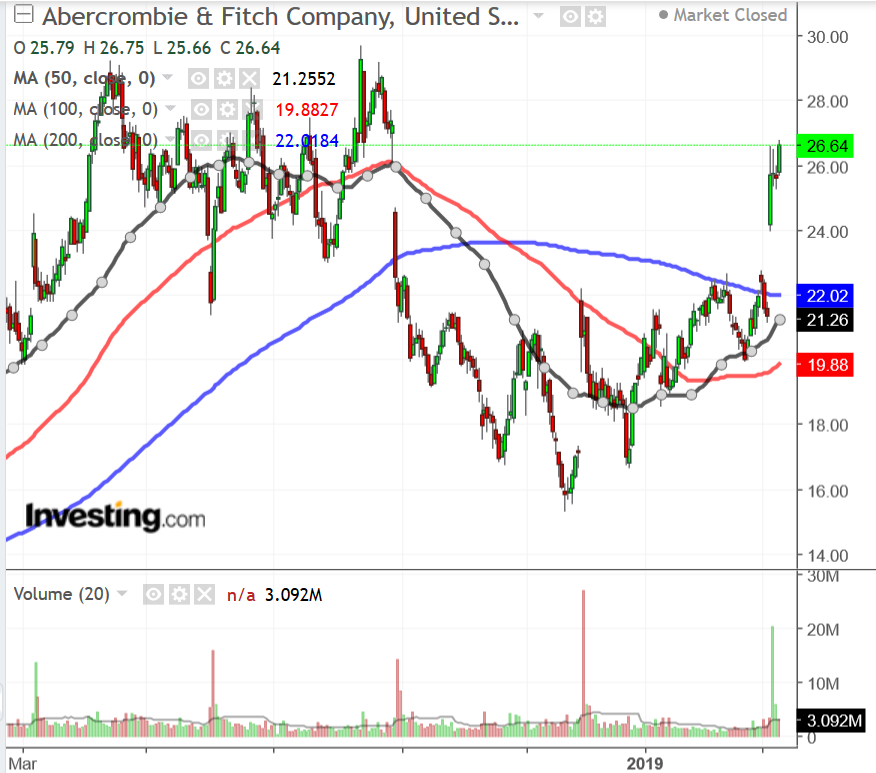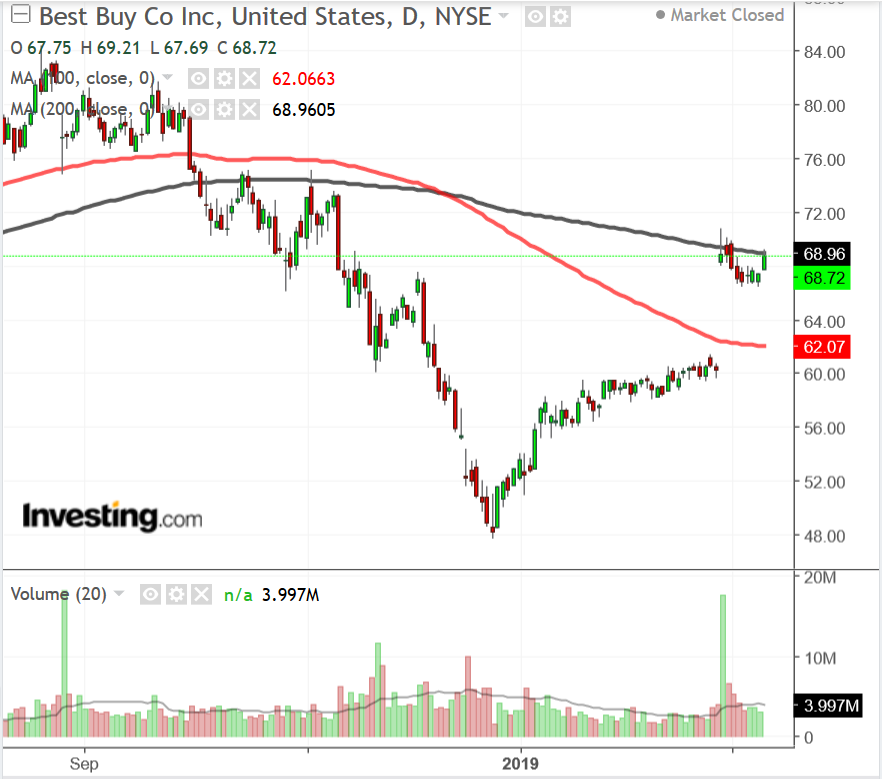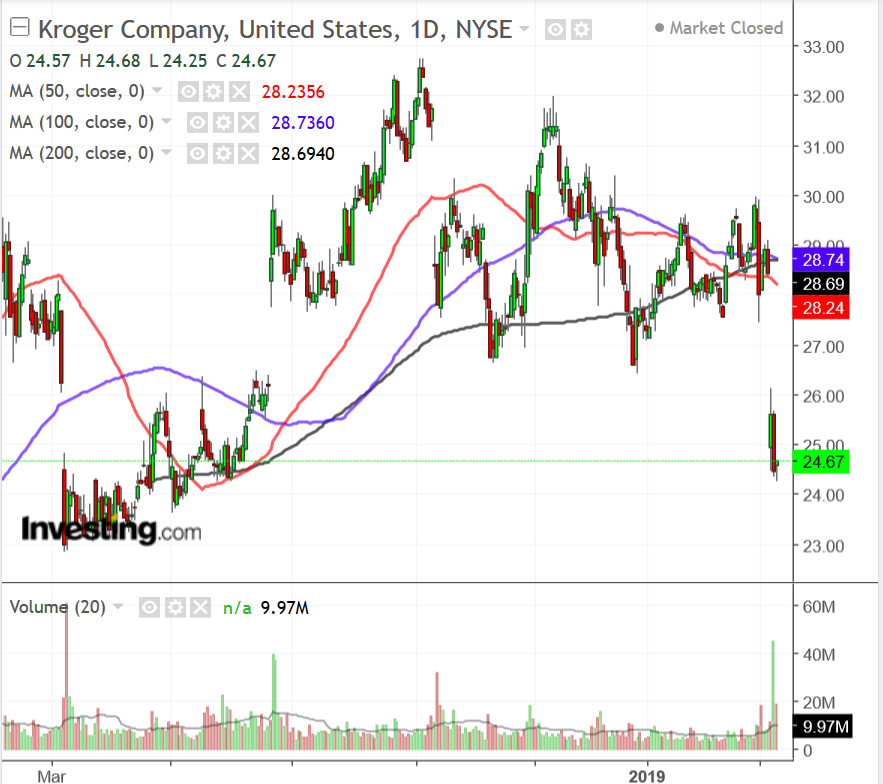The last group of companies to report Q4 earnings this season were major U.S. retailers, and the results were a decidedly mixed. On the winning side were the companies that have worked out online strategies to compete with Amazon, while also finding the right mix of products and services to keep shoppers coming into their stores. On the flip side are the laggards that have have failed to keep up with the changing tastes and buying habits of American consumers.
Now that all the information is in, here's a closer look at two retailers that surprised and one that severely disappointed:
Winner: Abercrombie & Fitch Transformation Initiatives Gaining Traction
Abercrombie & Fitch (NYSE:ANF) easily beat fourth-quarter forecasts when it reported on March 6. Results showed the apparel and accessories retailer successfully continuing a turnaround of its teen clothing chain.
Shares of Abercrombie, which closed at $26.64 yesterday, spiked around 20% after its report, and are up roughly 19.5% over the last year. In comparison, the S&P 500 index is nearly flat over the past 12 months, while the S&P Retail Select Industry Index lost 0.7%.

Abercrombie & Fitch, which also owns Hollister, earned $1.35 per share during the fiscal fourth quarter ended Feb. 2, topping average analyst estimates by 20 cents. Sales at locations open for at least a year jumped 3%, double analyst consensus, thanks to strong performance in the U.S.
Notably, the company's digital business continued to execute well. Digital channel sales surged 36% in the fiscal fourth quarter and topped the $1-billion mark for the full year.
The teen apparel company has been trying to turn around its struggling business by shrinking the size of its stores, boosting online sales and changing up its marketing strategy through loyalty programs and other initiatives. During the earnings call, CEO Fran Horowitz said, "Our transformation initiatives are gaining traction."
Looking to fiscal 2019, Abercrombie provided a robust forecast. It expects the momentum from strong top-line growth, gross margin expansion and operating expense leverage witnessed in fiscal 2018 to continue.
The retailer is planning to remodel or add 85 locations this year, up from 67 in 2018. It is also planning to close up to 40 stores, mostly in the U.S.
From a technical perspective, ANF shares charged above their 200-day moving average late last week. That's a bullish development likely to signal more gains in the weeks ahead.
Winner: Best Buy's Death by E-Commerce Greatly Exaggerated
Shares of Best Buy (NYSE:BBY) have been on a tear since the company reported better-than-expected holiday-quarter sales on Feb. 27 and gave an upbeat profit forecast for the year. The blockbuster report sent the stock up 14% that day.
Nonetheless, the stock, which closed yesterday at $68.72, is still down about 7% in the past year.

The electronics retailer, which cited the frenzy around the popular "Fortnite" video game as a catalyst for a boost in sales of gaming gear, also announced an 11% hike to its quarterly dividend, bringing its yield to almost 3%, and a plan to buy back $3 billion of stock.
Investments in its online business are also starting to pay off. Best Buy's domestic online revenue surged 9.3% in the three months ended Feb. 2, to $2.96 billion.
Perhaps more significant, Best Buy has managed to ward off pressure from Amazon (NASDAQ:AMZN), by focusing on customer services that have helped drive both store and online sales. A $199-per-year "Total Tech Support" program launched in May, which includes unlimited support online and in stores, saw 1 million members sign up by the end of the year, the company said.
“Our customers are noticing the improved experience we provide them as they interact with us digitally, in stores or in their homes,” CEO Hubert Joly said. Joly attributed the company’s performance, in part, to technological innovation, which he said could “drive customer demand.”
From a technical perspective, following its earnings beat, BBY crossed above its 200-DMA near $68.96 for the first time since November, only to fall back below it the following week. The stock next needs to successfully close above that level in the near-term to show that buyers are in control.
Loser: Kroger Digital Sales Growth Falling Further Behind Peers
Investors did not like what Kroger (NYSE:KR) had to say when it released weaker-than-expected fiscal fourth-quarter earnings on March 7. The grocery store chain has been struggling to compete against both e-tail and brick-and-mortar giants such as Amazon and Walmart (NYSE:WMT).
Shares of Kroger, which ended at $24.67 yesterday, tumbled approximately 10% in response to the disappointing report. Over the past year, the stock has gained 2.4%.

For Q4, which ended Feb. 2, Kroger's earnings and revenue came in below expectations. The supermarket chain warned that its fiscal 2019 earnings will be worse than anticipated as it invests in new online initiatives in order to effectively operate in an increasingly competitive market.
The Cincinnati-based company, which also runs gas stations, forecast full-year earnings of between $2.15 and $2.25 per share, falling short of Wall Street expectations of $2.26.
Profits are expected to come under pressure as the retailer plans to spend even more to overhaul stores and improve its online business under a program the company is calling "Restock Kroger." The initiative, which was launched over a year ago, calls for the grocery chain to invest as much as $3.2 billion in fiscal 2019 on on the effort, up from $3 billion last year.
Ever since Amazon acquired Whole Foods in August 2017, grocers have been forced to step up their tech investments to avoid losing customers to the e-commerce giant. Despite seeing a 58% increase in digital sales growth during its fourth quarter however, some on Wall Street are unsure of Kroger's ability to compete with its heavy hitting peers. According to a recent note from Pivotal Research on Kroger's efforts, "Fiscal 2018 showed that while spending on omni-channel and digital growth strategies are very significant, the benefits haven't been nearly as obvious so far."
